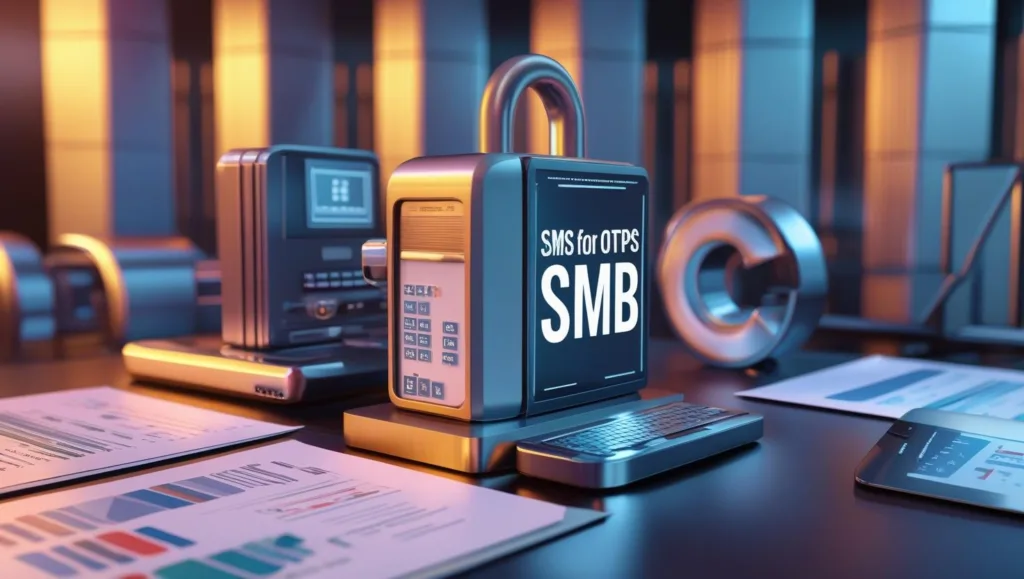Introduction
The global move away from SMS and email one-time passwords (OTPs) toward in-app and biometric authentication is more than a banking trend—it’s a wake-up call for small and mid-sized businesses (SMBs). With security threats rising and regulations tightening, this shift is starting in financial services but will soon ripple across all tools SMBs rely on, from payment platforms to customer portals. For SMB leaders, developers, and IT pros, understanding why this matters is critical to staying secure, compliant, and efficient.
Here’s what you need to know about this evolving landscape and why adaptation is non-negotiable.

1. Why SMS OTPs Are Becoming Obsolete
SMS OTPs are fading due to vulnerabilities and regulations that affect businesses directly:
- Vulnerability to Attacks: SMS codes are easily intercepted through SIM-swap attacks or phishing, putting SMBs at risk of financial losses, data breaches, and reputational damage. A single breach can cripple a small business with limited resources to recover.
- Regulatory Pressure: Frameworks like the EU’s PSD2 Strong Customer Authentication mandate robust multi-factor authentication (MFA) beyond SMS. Similar regulations are emerging globally, pushing businesses to comply or face penalties.
- Operational Inefficiencies: SMS delays due to network issues slow down critical tasks like payments or logins, frustrating employees and customers alike. Modern methods like in-app push notifications and biometrics are faster and more reliable.
This isn’t just a technical upgrade—it’s a fundamental shift in how SMBs must protect their operations.
2. Global Adoption of New Authentication Methods
The transition is already underway worldwide, signaling where security is headed:
- Europe: Post-PSD2, banks have adopted push-notification OTPs, hardware tokens, and biometrics, setting a standard for secure transactions.
- Asia-Pacific: Countries like Singapore, India, and Australia are prioritizing in-app authentication to enhance security and speed.
- North America: U.S. and Canadian institutions are shifting to push notifications and biometric logins, reflecting a broader industry push.
For SMBs, this global trend underscores that outdated security measures like SMS OTPs won’t cut it—whether you’re banking, processing payments, or managing client data.
3. Why This Matters to SMBs
The move away from SMS OTPs isn’t just about banking—it’s a signal that security standards are evolving across all business tools. Here’s why SMBs should care:
- Heightened Fraud Risks: SMBs are prime targets for cybercriminals due to limited resources for robust defenses. Modern authentication reduces vulnerabilities, protecting your finances and reputation.
- Regulatory Compliance: Failing to adopt secure methods could lead to penalties or restricted access to global markets, especially for SMBs working with international clients or vendors.
- Operational Efficiency: Faster, more reliable authentication (e.g., biometrics) streamlines workflows, saving time for lean teams and improving customer experiences.
- Future-Proofing: Banking is just the start. Payment platforms, SaaS tools, and customer-facing systems are all adopting these standards. Early adoption keeps SMBs competitive and secure.
Ignoring this shift risks falling behind, exposing your business to threats and inefficiencies.
4. The Bigger Picture: Security Trends SMBs Can’t Ignore
The shift from SMS OTPs is just the beginning—secure authentication is becoming standard across the tools SMBs rely on. Adapting now prepares you for what’s coming. Here’s how this impacts your operations and what to do:
- Payments (Stripe, PayPal, Square): App‑based MFA & tokens.
Action: Enable app or hardware MFA in your gateway settings. - SaaS (QuickBooks, HubSpot, Slack): Push notifications & biometrics.
Action: Switch on non‑SMS authentication in each platform’s security settings. - Customer Portals & Sites: In‑browser push or fingerprint logins.
Action: Plan your next dev sprint to add modern MFA. - API Integrations: OAuth/token support only.
Action: Verify your bank or ERP connections use token‑based auth.
By embracing these trends, SMBs can secure their entire tech stack, improve efficiency, and stay ahead of competitors.
Conclusion
The phase-out of SMS OTPs is a clear signal: security standards are evolving, and SMBs must adapt to stay protected and competitive. What starts with banking will soon encompass payment platforms, SaaS tools, and customer systems. By understanding why this shift matters—fraud prevention, compliance, and efficiency—and taking small steps to modernize authentication, SMBs can future-proof their operations.
Start now to secure your business and build trust in a rapidly changing digital landscape.
